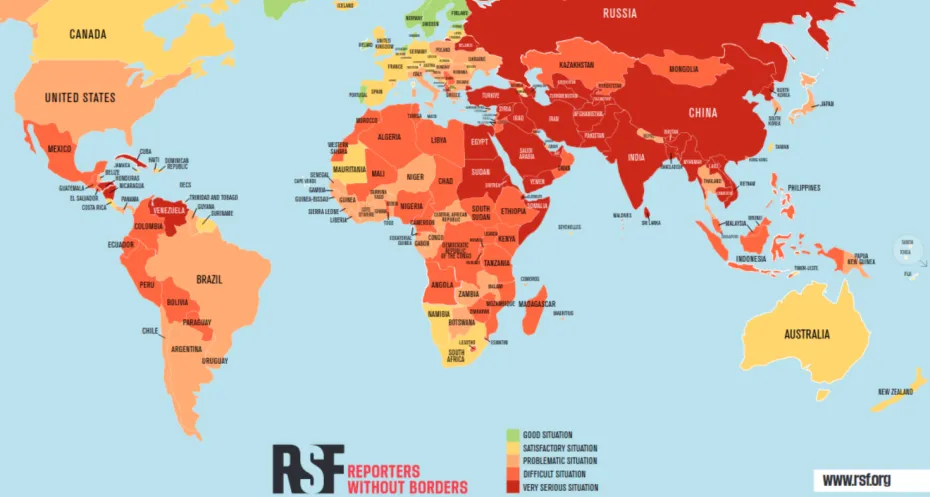A rise in authoritarianism puts press freedom under increasing pressure

The World Press Freedom Index compiled annually by Reporters Sans Frontières (RSF) shows that press freedom is under increasing pressure worldwide. Free Press Unlimited director Ruth Kronenburg: ,,In only 45 countries the situation for press freedom is (reasonably) good. Last year that was 52. The political barometer in particular is declining sharply: a bad signal for press freedom.''
The index confirms the extremely serious situation in the Occupied Palestinian Territories (spot number 157 out of 180 countries and regions). 2023 was the deadliest year for journalists over there. Free Press Unlimited is deeply concerned about access to reliable information, not only for the Palestinian population for whom information can be life-saving, but for the international public as well.
Free Press Unlimited's crisis team is constantly looking for ways to support journalists and their families on the ground, but at the moment it is almost impossible. ''This crisis is proving to be the most challenging we have seen within our work in terms of crisis response,'' says Kronenburg. ''When a ballistic vest with ‘PRESS’ on it can even put the journalist in greater danger, you know it's really bad.'' Free Press Unlimited calls for an immediate ceasefire and urges non-state actors and (world) leaders of all countries involved to ensure the safety of journalists reporting on the violence in Gaza.
Rise of autocracies threat to press freedom
Globally, the number of democratic states is declining, the number of autocratic leaders is increasing and governments are not doing enough to better protect journalists. In the RSF index, the global political barometer declined by 7.6 points. Ruth Kronenburg: "Where authoritarian leaders come to power, press freedoms are challenged almost immediately. Public broadcasters, for instance, come under the rule of a pro-government leadership and can no longer operate independently. That is an outright threat to press freedom.''
In 2024, more than half the world's population will go to the polls. Together with RSF, Free Press Unlimited observes that disinformation is on the rise, especially at election time. In dictatorships and autocracies, dissent is deliberately blocked or distorted with new technology. In Slovakia, for instance, a deepfake audio message featuring the voice of well-known journalist Monika Tódová was used to influence elections.
The World Press Freedom Index shows that media and press freedom is very poor in 36 countries (31 by 2023). It is poor in 49 (42) countries, problematic in 50 (55) and good or fairly good in 45 (52). This has put even greater pressure on press freedom worldwide.
The Erased
In the RSF index, legal protection is one of the barometers. We have seen increasing legal pressure on journalists worldwide, in the most serious cases even leading to imprisonment. In 2023, the Committee to Protect Journalists (CPJ) recorded 320 imprisoned journalists worldwide. That is three times as many imprisoned journalists as in the year 2000. These are serious numbers, especially when you keep in mind that every censored journalist is a lost perspective on the truth.
Free Press Unlimited is therefore using World Press Freedom Day for its 'The Erased' initiative. Using a special font, the consequences of journalists' imprisonment and censorship become visible. Each erased word symbolises an imprisoned journalist and represents the topics they report on, like ‘coup’, ‘war' or ‘genocide’. Organisations from the Netherlands, Syria, El Salvador and Macedonia, among others, have joined this movement to show the impact of censorship.